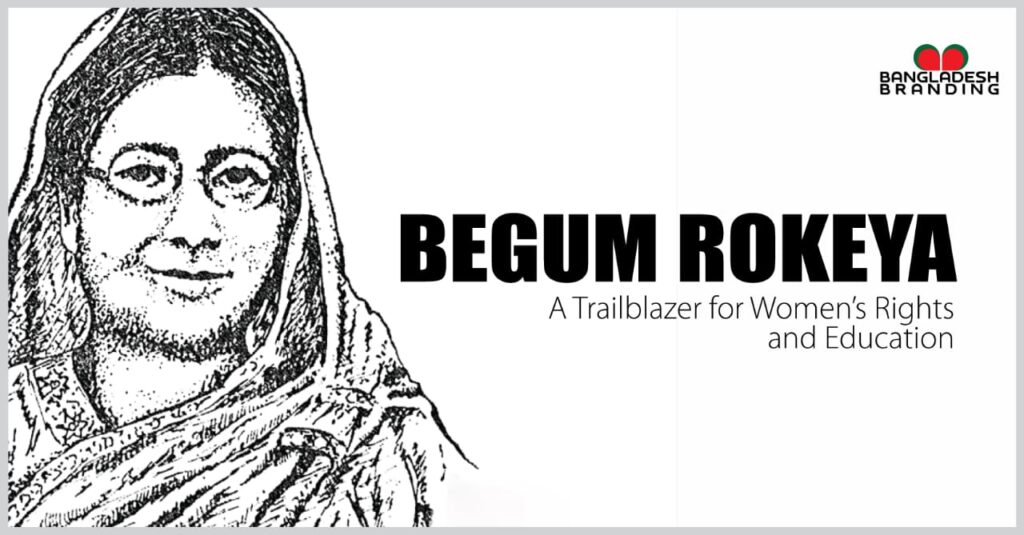Begum Rokeya Sakhawat Hossain (1880-1932) emerges as a towering figure in the annals of Bengali feminism, a visionary writer, educator, and social reformer whose tireless advocacy for women’s rights reshaped societal norms in early 20th-century South Asia. Born in Bhawal, Bengal (now Bangladesh), her life and work encapsulate the struggle for gender equality in a time when women were largely relegated to domestic roles and denied basic rights.
Early Life and Education
Rokeya was born into a wealthy but ultraconservative Muslim family on December 9, 1880, in the village of Pairaband, Rangpur. Her early years were shaped by patriarchal customs that saw women as less than human. Her father, Zahiruddin Muhammad Abu Ali Hyder Saber, married four times and believed in the teachings of ancient Indian lawgiver Manu, which considered women as embodiments of “untruth, sin, and darkness.” As a result, Rokeya was subjected to the extreme purdah system from a very young age, which isolated her from both men and women outside her family.
Despite these oppressive conditions, Rokeya’s quest for knowledge was unquenchable. Though her father denied her formal education, her eldest brother, Ibrahim Saber, played a pivotal role in her intellectual development. In the dim light of a candle after their authoritarian father retired for the night, Ibrahim taught her English and Bangla, nurturing her literary talents and igniting her passion for social justice.
Her marriage to Khan Bahadur Syed Sakhawat Hossain proved to be a turning point.She was encouraged to devote her life to fighting for women’s rights by Sakhawat, who had studied in England and shared her vision of women’s empowerment. Following his death in 1909, Rokeya used her inheritance to pursue her mission of education and reform.
Literary Contributions: "Sultana's Dream"
One of Rokeya’s most notable achievements is her 1911 novella, Sultana’s Dream. In this ground-breaking work, a young Muslim girl named Sultana imagines a utopian society called Ladyland, where women rule and men are confined to the home. In this satirical vision, society flourishes under female leadership, free from the corruption and violence often associated with patriarchal rule.
Ladyland is depicted as a place of harmony, where education is prioritized, child marriage is abolished, and communal living is rooted in love and truth rather than divisive rituals. By using her vivid imagination, Rokeya questions preconceived notions about women’s leadership abilities and critiques current gender norms. In addition to providing entertainment, this work acted as a potent change agent, encouraging women to imagine a more just future.
Advocacy for Education and Social Reform
Rokeya firmly believed that education was the cornerstone of women’s liberation. In 1911, she founded the Sakhawat Memorial School for Girls in Calcutta, addressing the glaring lack of educational institutions for Muslim girls. At a time when only two other schools existed for Muslim girls in the city, her initiative was revolutionary. In addition to providing entertainment, this work acted as a potent change agent, encouraging women to imagine a more just future. Rokeyapersevered despite strong criticism from religious conservatives who called her a “whore” and suggested she had hidden agendas.
She had a difficult time finding students because Muslim girls were not allowed to leave their homes without purdah due to cultural norms. In order to overcome these obstacles, Rokeya went door-to-door, reassuring families of the value of education and the safety precautions she would take. Her perseverance and tenacity paid off; she progressively increased the size of her school and provided access to education for numerous girls who would not have otherwise been able to.
Among the important social issues that Rokeya addressed in her essays and articles were child marriage, polygamy, and the widespread violence against women. She criticized men for being oppressive and women for internalizing ideals that were biased toward men in her writing. She exhorted women to break free from their “dehumanizing serfhood” in her stirring essay “Subhasadeq,” stating, “We are not animals! We are humans!” Her demands for action struck a deep chord with women, inspiring them to assert their rights and recover their dignity.
Political Activism and Legacy
Begum Rokeya was not only a proponent of education, but also a fierce defender of women’s political rights. She actively participated in the fight for women’s suffrage and used her position to advocate for legislation that would grant women the rights that they were routinely denied. Her writings were published in numerous newspapers and magazines, helping to spread the word about her message and raise awareness of the injustices that women face.
Her significant contributions to feminist theory cemented her position as a trailblazer in South Asia’s fight for gender equality. Her work had far-reaching consequences; she remains a symbol of strength and empowerment, inspiring countless activists.
In honor of Rokeya’s legacy, many organizations and projects in Bangladesh and India bear her name, including university halls, schools, and libraries. These tributes reflect her long-standing impact on women’s education and empowerment in the area. She is regarded as a pioneering figure in feminist literature, celebrated in modern discourse for the audacity and wisdom of her writing.

